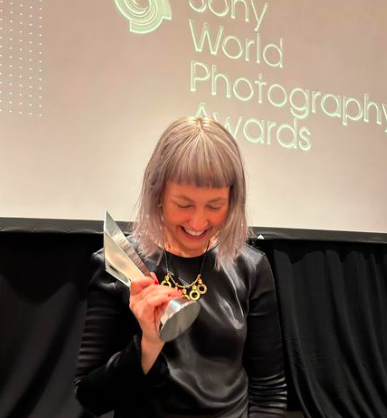Durban-born, Lee-Ann Olwage has won the prestigious Sony World Photography Award for her latest work entitled “The Right To Play”.
After being an avid admirer of Olwage’s visual stories for a solid few years, it comes as no surprise. She was always destined to make the world stop, look and listen and this time Sony did.
The story of Kakenya
Olwage was commissioned to create a short documentary on Kakenya Ntaiya in Kenya. Kakenya is the founder of a school and organization called Kakenya’s Dream.
The initiative started out as a primary school since access to education in rural Kenya was lacking. Today, the organization is based in the USA where they continue to raise funds to further develop the school.
Kakenya and her team have raised enough funds to add a high school to their portfolio.
Although Kakenya may be thriving now, her journey was not without upheaval.
At the tender age of 5, Kakenya was engaged to be married. According to Olwage, this is quite common in the rural areas of Kenya and within the Masai Mara culture.
By the age of 12, it was common practice for girls to either undergo female genital mutilation (FGM) or get married. Either way, a young girl’s fate would be determined for her, and finishing school would not be an option regardless of which road she took.
Kakenya agreed to get married, but she decided to flip the script on what was deemed the norm. She offered her father a proposition: let her finish school first.
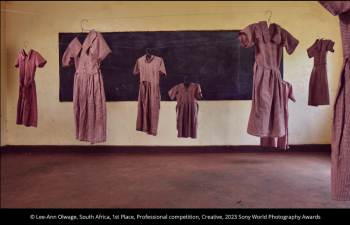
Source: World Photography Org
After finishing high school, an opportunity came knocking at her door – the chance to study in the USA. Understanding the Mara way, Kakenya went back to her father to ask for permission to further her educational endeavours.
At this point, her father understood that it was no longer a decision that he could make on his own and that Kakenya needed the permission of her elders within the community.
“Morning brings good news”
Every morning at sunrise Kakenya woke up bright and early and knocked on the door of a different elder each day to ask for their permission to go study abroad.
There is a Kenyan saying that Olwage enlightened me to, a saying that caused Kakenya to take inspired action: “Morning brings good news.”
Eventually, Kakenya got the permission of her elders, on condition that she promise to return and do something for her community once she finished.
Kakenya made good on her promise and she founded Kakenya’s Dream.
“The Right To Play”
“In Kenya, we spoke a lot about just being a child and how that’s completely taken away from girls with child marriage,” says Olwage with pure conviction.
“It’s not just about education, but about that freedom to play. It’s also about the freedom to dream. To have that space where you give the girls the opportunity to choose those things for themselves, like the choice to be married or not.”
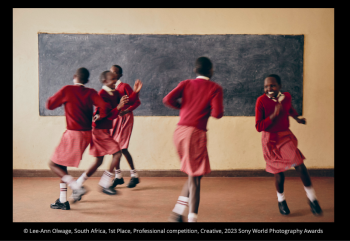
Source: World Photography Org
In an attempt to get to know the girls who attended Kakenya’s Dream, Olwage put out an open call for girls from the school to participate in a photo shoot on a Sunday afternoon.
“I needed to get to know the girls we were going to be filming and see who would be good in front of the camera,” says Olwage. “I needed to get a sense of the story I was telling.”
She set the scene with some lights, her computer, school desks, and some chairs. Olwage gleefully reminisces on how the girls entered the space and blew her away. “Every girl that walked into that school hall was so confident and knew exactly how she wanted to be portrayed,” notes Olwage.
“One of my favourite images is Alishers, on top of the chair. She was eight at the time. She took the chair and she put it on the stage and she got up and she stood there and looked at me and she’s like ‘I’m ready’. That was a big deal for me,” recalled Olwage.
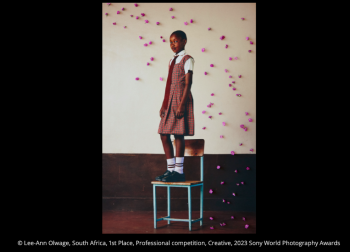
Source: World Photography Org
Olwage points out that there was a very apparent difference in self-esteem and overall self-assurance between the girls who were going to school and those who were not.
“The girls who go to school were given a sense of ‘you are worthy, your dreams are worthy’. They were being empowered and it was so obvious. There was just something different about them.”
A collaborative effort
“As a photographer, our ideas are very naive. When you conceptualize a project, you have a very basic understanding of someone’s identity, but you have this big task of portraying that”.
As Olwage had been shooting directly to her computer, the girls could instantly see their images and that was where the magic of collaboration happened.
“I asked them, ‘What do you think of this? Do you want to try this? What else do you want to do?’ And they were really directing it,” says Olwage. “They would even choose their favourite images. It gave me such a good idea of how they wanted to be shown”.
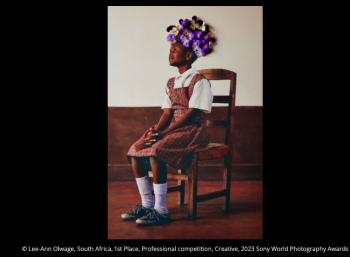
Source: World Photography Org
Today, FGM is illegal in Kenya, but it is still being practiced as it is still part of many traditional cultures, not only in Kenya, but in other parts of Africa and the world too.
Kakenya’s Dream is in the process of raising funds to build a healthcare centre close to the school for girls to learn about reproductive rights and other gendered cultural norms that are harmful to young girls in rural communities.
“The Right to Play” is on exhibition at the Somerset House in London from 14 April – 1 May 2023.
ALSO SEE:
German artist rejects photography award won by AI-generated image
Featured image: @leeannolwage (Instagram)

